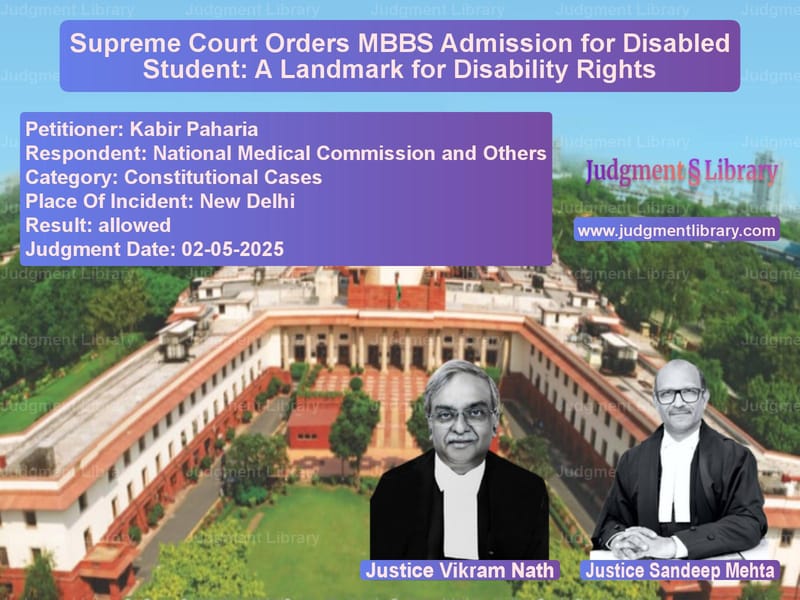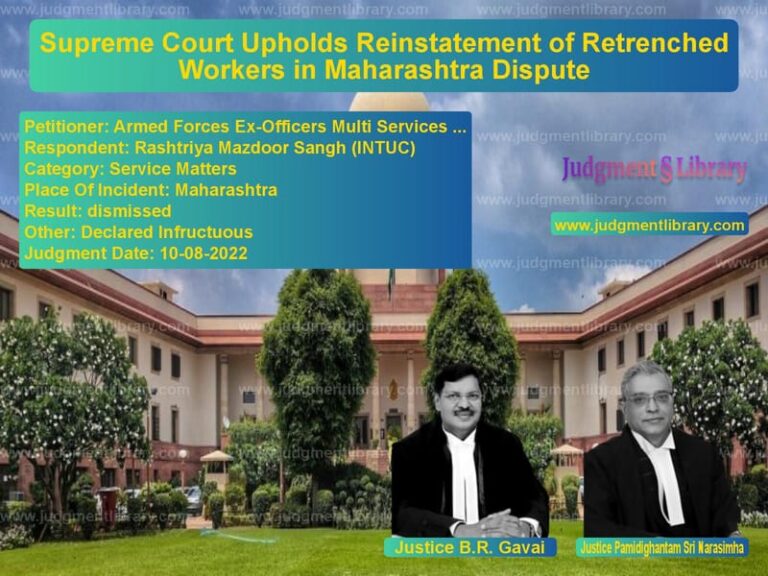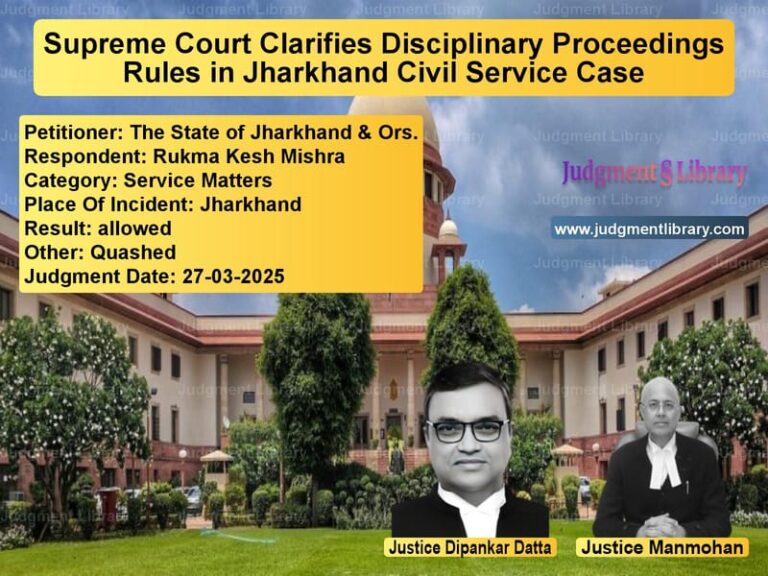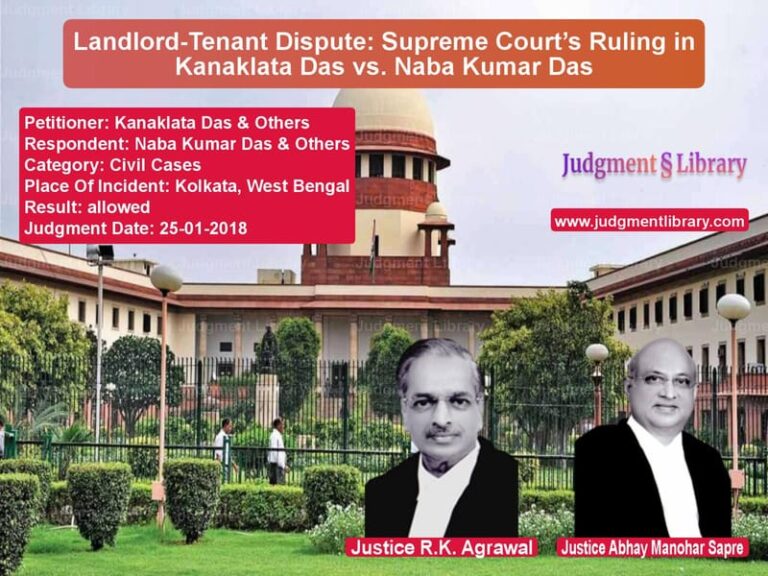Supreme Court Orders MBBS Admission for Disabled Student: A Landmark for Disability Rights
In a powerful judgment that challenges deep-seated institutional biases against persons with disabilities, the Supreme Court of India has paved the way for Kabir Paharia, a student with benchmark disabilities, to pursue his dream of becoming a doctor. The case represents a significant moment in India’s disability rights movement, highlighting the tension between medical education standards and the constitutional promise of equality.
Kabir Paharia, a Scheduled Caste student with congenital absence of multiple fingers in both hands and involvement of his left foot, had scored an impressive 542 marks in NEET-UG 2024, securing category rank 176 in the PwBD quota. Despite his outstanding academic performance and high merit position, he found himself repeatedly rejected from MBBS admissions based on medical assessments that declared him ineligible to pursue medical courses under existing NMC guidelines.
The journey through India’s judicial system began when Kabir approached the Delhi High Court after Vardhman Mahavir Medical College-Safdarjung Hospital assessed his disability at 68% but concluded that under NMC/MCI guidelines, he was not entitled to pursue medical courses. The certificate dated 19th August, 2024 stated clearly: “Based on quantification of disability The candidate is not eligible to pursue medical courses (as per NMC norms).”
When the High Court dismissed his petition and subsequent appeal, Kabir turned to the Supreme Court, where his counsel Mr. Rahul Bajaj presented compelling arguments that would ultimately reshape the outcome.
The Petitioner’s Arguments
Mr. Bajaj’s arguments centered on the core principles of disability rights and reasonable accommodation. He contended that “the impugned judgment and the decisions of both the medical Boards are inherently flawed inasmuch as neither the medical authorities nor the High Court duly adverted to the crucial concepts of assistive devices and reasonable accommodation to which the petitioner is entitled, under the Rights of Persons with Disabilities Act, 2016.”
The counsel emphasized that “the vital factors, i.e., the academic excellence of the petitioner, his performance in the NEET examination, the high placement in merit, were totally glossed over while denying relief to the petitioner.” He drew parallels with two landmark cases – Om Rathod v. Director General of Health Sciences and Anmol v. Union of India & Ors. – where the Supreme Court had recognized the concepts of assistive devices and reasonable accommodation.
Mr. Bajaj particularly highlighted the assessment methodology used in Om Rathod’s case, where Dr. Satendra Singh had posed four critical questions: “Would the proposed accommodation result in a failure to meet the NMC CBME’s inherent requirements? Not in my opinion. Would the accommodation legitimately jeopardize patient safety? Not in my opinion. Would the proposed accommodation result in the improper waiver of a core requirement of the CBME? Not in my opinion. Would the proposed accommodation pose an undue hardship on the medical college (budgets wise)? Not in my opinion.”
Comparing Kabir’s case to these precedents, Mr. Bajaj argued that “the petitioner herein is having much better physical/locomotor attributes and is well equipped as compared to the two candidates in the cases of Anmol (supra) and Om Rathod (supra). He also scored much higher marks than these candidates in NEET (UG) examination.”
The Respondent’s Position
Representing the Union of India and National Medical Commission, the respondents acknowledged the evolving nature of disability guidelines. They “urged that the Commission is under the process of revising its guidelines in compliance with the judgments in the cases of Om Rathod (supra) and Anmol (supra). Three meetings have already taken place, and the process is expected to be finalised before counselling for the next academic session commences.”
Their primary suggestion was that “the petitioner will not be prejudiced, if the consideration of this matter is deferred till the new guidelines are put in place.”
The Supreme Court’s Assessment
The Supreme Court, however, took a much more proactive stance. The bench observed that “prima facie, we find substance in the submission of the learned counsel representing the respondents that the process for revising the guidelines in terms of this Court’s decisions (supra) is underway and a final outcome is expected before the counselling session for MBBS (UG) 2025-2026 commences. However, we are not inclined to defer the proceedings at this stage.”
The Court strongly rejected the idea of delaying justice, stating that “denying relief to the petitioner on this premise would be totally unjustified in view of the ratio of this Court’s judgments in Om Rathod (supra) and Anmol (supra). Merely because the NMC is under the process of revising the guidelines, the petitioner’s fate cannot be allowed to hang in a limbo in spite of the fact that he has performed exceedingly well in the NEET (UG) 2024 examination and stood high in the merit in his category.”
The Court then directed a fresh medical assessment by a five-doctor board at AIIMS New Delhi, specifically instructing that the assessment be conducted “with due deference to the ratio of this Court’s judgments in Om Rathod (supra) and Anmol (supra).”
The Turning Point: Medical Board Report
The new medical board’s report dated 24th April, 2025 proved to be the turning point in the case. The comprehensive assessment revealed that Kabir “underwent a comprehensive neurological examination as part of the Medical Board assessment. It was observed that Mr. Kabir has a significant absence of multiple digits in both hands (specifically, the index and middle fingers on the right hand, and the index, middle, and ring fingers on the left hand) as well as in the left foot (notably, the second and third toes).”
Crucially, the board reported that “he was asked to demonstrate various skilled techniques in the simulation laboratory, including chest compressions, intravenous cannulation, assembly of a laryngoscope, intubation, and suturing, all of which he executed satisfactorily. He demonstrated functional adaptation using his existing digits during these tasks.”
The only challenge noted was that “he faced minor challenges while attempting to put on the sterilized standard gloves. He had slight coordination problems and delays caused by the lack of fingers and empty finger slots in the gloves.”
The Court’s Powerful Response
The Supreme Court’s response to this report was both practical and profound. The judges declared: “We feel that the mindset must change and this trivial aberration, by no stretch of imagination, can be a ground to deny admission to the appellant in the MBBS UG course, when he is otherwise qualified and scored exceeding high rank in the NEET-UG 2024.”
The Court noted the injustice in the admission process, observing that “according to which a candidate with Roll No. 14491, who ranked 159816, was allocated a seat at AIIMS, New Delhi under the Scheduled Castes PwBD category. Apparently thus, a candidate who stood much below the appellant in merit has been admitted against the reserved seat at the AIIMS, New Delhi to which the appellant had a valid claim.”
In their strongest condemnation of the system, the Court stated that “the denial of admission to the appellant in the MBBS UG course was grossly illegal, arbitrary and violative of the appellant’s fundamental rights as guaranteed under Articles 14 and 16 of the Constitution of India. Such action not only reflects institutional bias and systemic discrimination but also undermines the principles of equal opportunity and non-discrimination enshrined in our constitutional framework.”
The judgment articulated a powerful vision of substantive equality: “The constitutional mandate of substantive equality demands that person with disabilities (for short ‘PwD’) and PwBD be afforded reasonable accommodations rather than subjected to exclusionary practices based on unfounded presumptions about their capabilities.”
The Final Order and Broader Implications
The Court directed that “the appellant shall be allocated a seat in the MBBS UG course 2025 against the Scheduled Castes PwBD quota in the All-India Institute of Medical Science, New Delhi, in the forthcoming academic session” and clarified that “the appellant shall not be required to undergo the NEET-UG 2025 examination.”
Beyond Kabir’s individual case, the Court issued a broader mandate: “We further direct that the National Medical Commission shall forthwith and not later than within a period of two months from today and at any cost before the counselling for the 2025-2026 session commence, complete the process of revising the guidelines in light of judgments of this Court in Om Rathod v. Director General of Health Sciences and Anmol v. Union of India & Ors. so that no deserving candidate in the PwBD category is denied admission into the MBBS course in spite of his/her/their entitlement.”
The Court emphasized that “It must be ensured that systemic discrimination against persons with benchmark disabilities, whether direct or indirect, is eliminated and that the admission process upholds their right to equal opportunity and dignity.”
In perhaps the most significant constitutional interpretation in the judgment, the Court declared: “The constitutional promise of equality is not merely formal but substantive, requiring the State to take affirmative measures to ensure that PwD and PwBD can meaningfully participate in all spheres of life, including professional education. We emphasize that reasonable accommodation is not a matter of charity but a fundamental right flowing from Articles 14, 16, and 21 of our Constitution.”
The judgment concluded with a stark warning to administrative authorities: “When administrative authorities create arbitrary barriers that exclude qualified PwBD candidates, they not only violate statutory provisions but also perpetuate the historical injustice and stigmatisation. The fundamental rights and the dignity of PwD and PwBD candidates must be protected by ensuring that assessment of their capabilities is individualised, evidence-based, and free from stereotypical assumptions that have no scientific foundation.”
The Court also expressed appreciation for Mr. Rahul Bajaj and Mr. Amar Jain, both “persons with benchmark disability (zero vision), for the excellent assistance provided by them during the course of hearing of the present matter,” acknowledging the importance of representation in legal proceedings involving disability rights.
This judgment marks a significant step forward in India’s disability rights jurisprudence, establishing that academic merit cannot be overshadowed by physical disabilities when reasonable accommodations can enable successful participation. The Court’s insistence that “the mindset must change” serves as a powerful directive to all educational institutions to move beyond tokenism toward genuine inclusion.
Petitioner Name: Kabir Paharia.Respondent Name: National Medical Commission and Others.Judgment By: Justice Vikram Nath, Justice Sandeep Mehta.Place Of Incident: New Delhi.Judgment Date: 02-05-2025.Result: allowed.
Don’t miss out on the full details! Download the complete judgment in PDF format below and gain valuable insights instantly!
Download Judgment: kabir-paharia-vs-national-medical-com-supreme-court-of-india-judgment-dated-02-05-2025.pdf
Directly Download Judgment: Directly download this Judgment
See all petitions in Fundamental Rights
See all petitions in Education Related Cases
See all petitions in Reservation Cases
See all petitions in Public Interest Litigation
See all petitions in Judgment by Vikram Nath
See all petitions in Judgment by Sandeep Mehta
See all petitions in allowed
See all petitions in supreme court of India judgments May 2025
See all petitions in 2025 judgments
See all posts in Constitutional Cases Category
See all allowed petitions in Constitutional Cases Category
See all Dismissed petitions in Constitutional Cases Category
See all partially allowed petitions in Constitutional Cases Category







